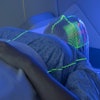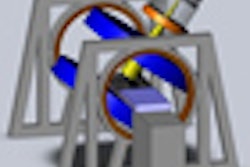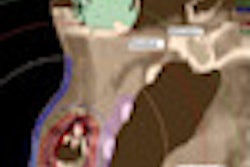Dear AuntMinnie Member,
The massive storm system raking the East Coast is having a major impact on the world of radiology.
Hospitals have put disaster preparedness plans into place, with at least one facility -- NYU Langone's Tisch Hospital -- forced to evacuate due to a power failure. The hospital is in lower Manhattan, which was the location of a major power outage on Monday night, according to published reports.
A bit farther north in Boston, Hurricane Sandy halted the proceedings of the American Society for Radiation Oncology (ASTRO) annual meeting. Conference organizers were forced to cut the meeting short on Monday afternoon, as authorities prepared for the storm's arrival.
Features editor Wayne Forrest has been on hand for our Radiation Oncology Digital Community and rode out the storm in Boston. Today, he reports that things are returning to normal and the sun is out after a stormy night. The ASTRO conference is back on full schedule, with just a few changes.
Our clinical coverage of ASTRO starts with a story on the use of a dynamic contrast-enhanced MRI protocol to predict spine tumor recurrence. New York City researchers found that the protocol could be used to measure plasma volume in spine tumors, which proved to be a better tool than conventional MRI for predicting regression after successful surgery. Read more by clicking here.
We're also highlighting an article on the use of proton therapy for prostate cancer patients. Although proton therapy has drawn some controversy due to its high price tag, researchers from multiple sites found that patients who received proton treatments had excellent outcomes and quality-of-life scores. Learn more by clicking here.
Also, we have a related article on how proton therapy outperformed intensity-modulated radiation therapy, as well as coverage of a study that indicates breast cancer patients who undergo breast radiation therapy have no increased cardiac morbidity.
Continue checking in with the community at radiation.auntminnie.com for more news from the ASTRO conference.
More support for breast screening
Finally, a new study in Lancet provides more support for the effectiveness of mammography screening. An independent panel found that breast screening in the U.K. led to a 20% reduction in risk of dying from breast cancer and that it saves about 1,300 lives a year.
The panel also found that overdiagnosis remains a problem, with women who participate in screening having a 1% chance of a cancer being diagnosed and treated that might never have caused problems.
While those in radiology might view the study as positive, critics of mammography are already fixating on the overdiagnosis finding as validation of their contention that mammography's benefits have been oversold -- and so the endless debate continues. Read our article on the study by clicking here, or visit our Women's Imaging Digital Community at women.auntminnie.com.


















